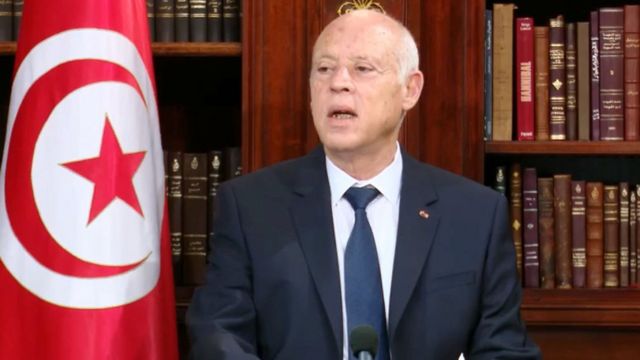Tunisia: Saied denounces the interference of the magistrates in the procedures relating to the reform of the judicial system

Tunisian President Kais Saied rejected the intervention of judges in his measures to review and reform the judicial system and described his action as a “coup”.
He made the remarks during a meeting with the Council of Ministers at the Carthage Palace in Tunis, according to a video posted on the official Facebook page of the Tunisian presidency.
On Wednesday, the Supreme Judicial Council in Tunisia, a constitutional body, rejected reviewing and reforming the judicial system through presidential decrees, calling on judges to uphold their independence.
Saied said: “What I hear and disdain is for a judge to speak of a coup”. What the judge has to do with the reservation requires that he be silent and that the law be faithfully applied.
Last December, Judge Ahmed Rahmouni wrote in a post on Facebook: “I do not know whether it has become clear to all people that Kais Saied’s approach to the staged coup against the state institutions with security and military support”.
*
In his speech, Saied stressed that “there is only one legislator, not thousands of legislators”. He explained that a decree “on the judiciary and penal reform (with corrupt officials) will be issued in the next few days so that the people’s money will be returned to the people”.
“Those who committed crimes against the Tunisian people in the environmental, health and educational fields must be held accountable”, he said.
“They are trying to hit the state, they think they are the state”, he said, stressing that “there is no state. Judges are state judges”.
For some time now, there has been a debate in Tunisian legal circles about the independence of the judiciary, especially in light of Saied’s statement that the judiciary is “a function of the state”, as well as his allusion to the possibility of dissolving the Supreme Judicial Council.
Last October, Justice Minister Leila Jaffel announced the drafting of a law on the Supreme Judicial Council, to the dismay of many judges.
Judges in this regard considered interference in the judicial process, while Saied said judges would be involved in preparing this draft.
In recent months, Saied has made numerous statements about the judiciary, including that it is “independent and has no authority other than the law” and that “there is no way to cleanse the country except with a just judiciary and judges above all suspicions”.
The Tunisian president criticized the Independent High Electoral Commission, questioning its independence. He said: “The Independent High Electoral Commission should be independent, not a tool for a number of people”.
Saied said the only sum he paid during his 2019 campaign was 50 dinars, saying he refused public funding.
The Tunisian president also denied any connection with the Facebook pages supporting him, saying that he had communicated repeatedly with the electoral commission.
On Wednesday, the Tunisian judiciary referred 19 people to trial for “electoral irregularities”, including Ennahdha leader Rached Ghannouchi and former president Moncef Marzouki.












